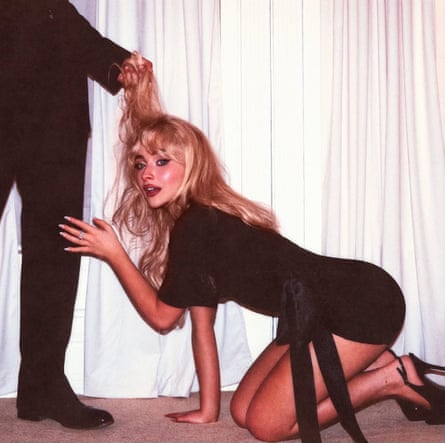Sabrina Carpenter was accused of dragging women back into an unenlightened past last week, as the controversial cover for her new album was met with (apparently) feminist furore. It’s ironic, then, that the past is precisely where Carpenter’s most outspoken critics could do with looking. It’s clear that the general consensus is lurching grimly to the right when it comes to gender, and a new generation of young, female critics should be wary of falling into step. The debate about how we look at women, and what they want, risks limply missing the point.
In the past few weeks, Sydney Sweeney has been chastised for selling sexy soap, and Addison Rae scolded for dancing in her underwear on stage. It’s odd that the backlash has been so immense, given the celebration of Halina Reijn’s Babygirl film just a few months ago. The SheEO Nicole Kidman slurping milk out of a saucer? Hot. Sweeney’s dirty bathwater? Degrading and vapid. Seemingly, Kidman’s age made the former radically feminist, and by extension, permissible in the eyes of the kink police.
It is relevant that these debates now take place on online platforms. At their best, these spaces could provide a rare forum for popular culture to be taken seriously. From uses of the “sexy virgin” trope to golden-age glam fantasies of whiteness, to the transformative influence of a queer audience, there are so many interesting things to say about women such as Carpenter, Sweeney and Rae, and how we are encouraged to read them. Instead, the conversation is dictated by sexist algorithms, financially rewarding those with the most extreme views. Liberation no longer brings clicks, and so to open TikTok is to fall headfirst into a sea of diatribes so puritanical they’d bring a tear to Oliver Cromwell’s eye.

None of this is to say that to criticise the pop girlies is blasphemy, but vitriolic chastisement is no substitute for meaningful critique. One TikTok user, priding herself on inspiring tellings of “Herstory”, asserts: “Sabrina knows nothing … [she is] a disgrace to every woman that has ever lived.” Oddly, accounts like this have a fetishistic preference for girlbosses centuries dead, happy to build a brand around celebrating “first” women (authors, chemists, queens, you name it), while throwing abuse at those making headlines today. If only, the inference usually seems to be, young women such as Carpenter could be as good at feminism as Jane Austen or Anne Boleyn.
In fact, the real lessons are to be learned from histories a little more recent. These critiques seem largely ignorant of the “sex wars” of the 1970s, which saw militant feminists such as Andrea Dworkin argue that whatever the context, pornographic imagery was hateful, exploitative and male. Against her were sex-positive feminists such as Angela Carter, attempting to think generously and with complexity about desire and domination in women’s lives. If anyone could be bothered to dig it out, Carter’s 1978 book The Sadeian Woman might turn the argument about Carpenter on its head. There, she historicises the “good bad girl”, “blonde, buxom” with a “childlike charm”, suggesting the impossibility of writing about power and sex without writing about capitalism too. For Carter, pornographic imagery, playing on domination and subordination, wasn’t to be straightforwardly judged or disregarded, but might instead be seen as “a critique of current relations”.

For all that the sex wars were aggressively fought, they were also full of rich argument, breadth and a long-lost awareness of economic forces. One thing Dworkin did get right was pornography’s grim realities when constrained to a ruthless commercial sphere. When it comes to the multibillion-pound porn industry and the world of pop, those with the real power, much like the anonymous, suited man on the cover of Carpenter’s album, rarely appear in frame.
It’s ironic, then, that in January, no less than the record producer Pete Waterman singled out Carpenter as a small blond symbol of sexism. She was, he claimed, setting women’s rights back years, adding: “If you’re asking to be respected, don’t come on in a G-string.” I’m not sure Carpenter needs to beg for respect from those cooped up in the retirement home for pop producers presumably still profiting from Kylie’s hotpants, but those comments serve to remind us that little has changed when it comes to raking in the cash. That latter-day Pete Watermans are still those benefiting, in this case from charged debates about violence against women, is what socialist-feminists would have been pointing out decades ago, and precisely what we should be talking about today.
If images of sexual subordination make some feminists uncomfortable, we should talk about that too. Instead, we’re reverting to ironically paternalistic tellings off. Of course, it should come as little surprise to find the parameters of feminine sexuality being policed under the patronising pretence of concern for women’s safety. It’s precisely this logic that has been weaponised against transgender women for years. The result? A feminism that packs women into smaller and smaller boxes with every convenient transgression that comes along.
We might ask questions about the unhappy marriage of capitalism and kink, but suggesting that women who want to experiment consensually with images of domination should in some way take the blame for male violence is dangerous, distracting and ignorant of history. Decades of work (against, for instance, the so-called “rough sex defence”) have been spent protecting women’s right to express themselves sexually without fear of harm – it isn’t “choice feminism” to try to hold that ground.
“I can’t escape your history,” sings Carpenter on a 2022 track. If only those attacking her felt the same way about the feminism they invoke, they might see what’s really going on here. It’s not so much a return to sexy pop that is restricting women as the censorious criticisms that pop’s profit-driven branding seems perfectly calculated to provoke.
-
Jennifer Jasmine White is a writer and academic

 2 months ago
66
2 months ago
66

















































